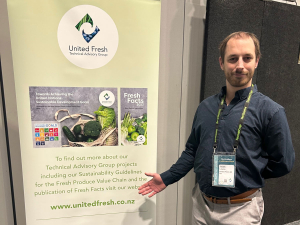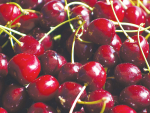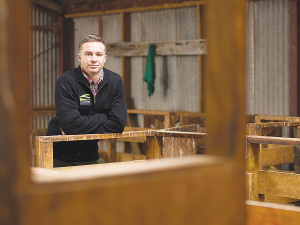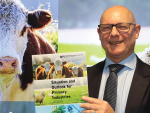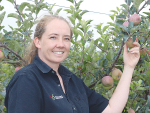United Fresh has been invited to speak at the 2024 International Sustainability Summit in Vancouver this week.
Hosted by the International Federation of Produce Standards (IFPS) and the Global Coalition of Fresh Produce (GCF), the annual summit is attended by key players across the international supply chain. The invitation to speak is a unique chance for New Zealand’s fresh produce industry to lead key conversations around climate action and how to reduce poverty, hunger, and inequality.
Dr Hans Maurer and Jacob Lawes, from United Fresh’s Technical Advisory Group will present our industry’s efforts to meet the United Nations’ Sustainable Development Goals (SDGs) which were adopted by the New Zealand government in 2015.
“Last year United Fresh unveiled guidelines for New Zealand’s fresh produce value chain to support individual businesses and organisations, from field to fork,” explains Dr Maurer.
“These guidelines are a blueprint to achieve a better and more sustainable future for all. It appears that United Fresh is essentially leading the global fresh produce industry by developing this resource.”
United Fresh Projects Manager Jacob Lawes says the focus must now shift to implementation.
“We want to see individual organisations and associations figuring out what they need to do to meet the SDGs and beginning their journey in terms of practical implementation – not just talking, thinking or planning but actually doing.”
One example is taking action to mitigate the impact of climate change in those areas that the horticulture sector and produce industry can directly influence.
“That could involve switching to electric vehicles, preventing fruit and vegetable waste which decomposes into methane, offsetting emissions through plantings, and optimising your business to reduce greenhouse gas emissions needed to produce a kilo of food,” Lawes explains.
“Sustainability improves your income. Sustainable practices reduce costs such as fossil fuels. Efficient modern equipment means you’re not having to pay fines or high maintenance costs. New equipment gives you a better rate of return because it’s more reliable, has lower emissions and is more productive per unit of energy used.”
Lawes says it’s important to accept that climate change is happening here and now.
“We’ve been seeing the impacts for several years now – the most obvious example being Cyclone Gabrielle. We have to adapt to the new normal. How do we reduce the impacts? And how do we try and redesign our way of operating in a way that reduces the damage to our planet, our people and our business?
“Climate change means certain areas are no longer going to be economically viable for certain crops, and businesses will have to consider moving production areas to remain viable. It also means you need to consider practical mitigations on site, like water redirection or soil erosion management.”
MPI’s Situation and Outlook for Primary Industries report released last December noted the impact of wild weather is a contributing factor to the forecasted drop (1%) in horticulture export revenue in the year to 30 June 2024.
New Zealand is “expected to be exposed to extreme temperature swings” the report says, and a new drought forecasting tool has been launched to help growers better prepare for adverse weather.
“The previous ‘one-in-100-year’ storms are increasingly going to become one every 10 or 20-year events,” Lawes says. “So, the bar of what you have to meet is higher. And if you don’t meet it, your site is going to be damaged or destroyed.”
The impact will be felt by the entire industry, not just growers, he says.
“The consequences of not being sustainable impacts everyone. It’s going to affect how we all live our daily lives. That’s why it’s so important that as an industry, we start acting now.”




